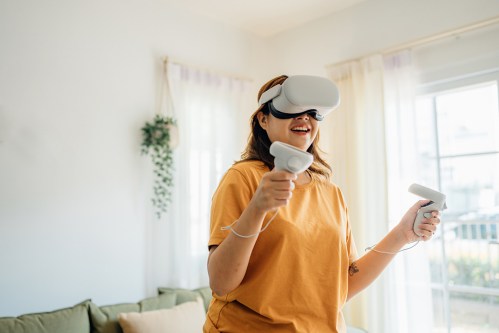‘I’m a Brain Health Coach, and This Is Why Gaming Is One of the Best Things You Can Do for Your Fitness, Longevity, and Cognition’
Combining mental and physical skill training, exergaming for brain health is one of the best ways to stay sharp long-term

There are lots of ways to keep your brain healthy as you age. For starters, you can eat brain healthy foods like omega-3 fatty acids. You can drink plenty of water, keep your blood pressure in check by managing stress, exercise, and make tiny tweaks to your routine to get more non-exercise movement throughout the day (like taking the stairs in lieu of an elevator), which can help ward off neurodegenertive diseases.
Experts in This Article
Ryan Glatt, CPT, is a brain health coach and the director of the FitBrain program at the Pacific Neuroscience Institute.
Another thing to add to your list? Exergaming.
Never head of it? No worries. “Exergaming is active gaming, or gaming that requires physical movement in order to play,” says Ryan Glatt, MS, CPT, NBC-HWC, a brain health coach and the director of the FitBrain program at the Pacific Neuroscience Institute. “Common historical examples include Dance Dance Revolution and the Nintendo Wii, while more modern examples include virtual reality exergames and those on platforms like the Nintendo Switch.”
The benefits of exergaming
Exergames can have a broad array of benefits depending on the population in question, according to Glatt. “For older adults with or without neurological conditions like Parkinson’s disease or cognitive impairment like dementia or mild cognitive impairment, exergames have been found to benefit cognition, mood, and motor functions like balance,” he says.
In 2019, a systematic review showed that open-skill exercise—any kind of exercise that’s unpredictable, like exergaming—can improve certain cognitive functions compared to closed-skill exercise, such as predictable machines, he adds.
Exergaming is also a way to improve your dual-task performance. “Dual-tasking is the simultaneous execution of two tasks that can be performed and measured separately,” Glatt explains. “Dual-tasking appears in more skill-based exercise modalities like sports, dance, martial arts, and mind-body exercise.” These can have a host of brain and body benefits, he says.
Anyone can benefit from better dual-task capabilities, but research shows that it’s particularly helpful for older adults and people with attention deficits.
How often you need to exergame for better brain health
While brain health becomes more of a concern as you get older, the earlier you start strengthening your neural and cognitive functions—and the more consistently you do so over your lifetime—the better chance you have of keeping your mental faculties intact. Ideally, Glatt says he’d like to see more research on the benefits of exergaming in healthy populations.
Still, it’s clear that consistency is key when it comes to making any meaningful changes to your mind or body. The more regularly you play exergames over a long period of time, the better chance you have of reaping their benefits.
“There was a systematic review in 2017 that found that a minimum of 12 weeks, with 60 minutes per week of exergaming was required to sustain cognitive benefits in attention, executive functions, and visuospatial skills,” Glatt says. “More research is needed to understand of what combination of exergames is needed to obtain certain goals, and for whom, and how long these benefits last.”
Why training your brain while you train your body could be the future of fitness
One of the easiest, most effective ways to change your behavior is by habit stacking, meaning pairing a new routine with one you already do. So a potentially simple way to get more people exergaming is by combining this type of mental training with the physical training they’re already doing. To this end, the American Council on Exercise, one of the largest personal trainer certification programs in the country, tapped Glatt to create a brain health trainer course for its members.
“There was no other sound information on brain health and exercise that was really applicable,” Glatt says. “I hope that by trainers learning about how the brain ages, the fundamentals of neuroscience, the effects of exercise on the brain and how this informs programming, they can be a crucial force in fighting the epidemic of neurodegenerative diseases from a prevention standpoint.” Certainly something to think about.
—reviewed by Smita Holden, MD
Sign Up for Our Daily Newsletter
Get all the latest in wellness, trends, food, fitness, beauty, and more delivered right to your inbox.
Got it, you've been added to our email list.










